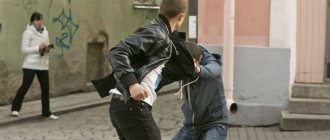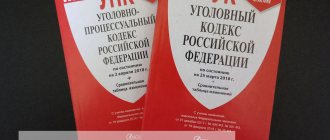- home
- Services
- Criminal proceedings
- Professional defense in court by a lawyer
An unlawful act, which is classified as unintentional infliction of grievous bodily harm, entails criminal liability. During the investigation, it is necessary to establish two main points: what harm was caused to the health of the victim, and whether there was intent on the part of the criminal. If we are talking about the absence of intent and grievous harm, then the punishment is established in accordance with the norms of Art. 118 of the Criminal Code of the Russian Federation .
Features of the crime
Moderate injuries include all injuries that:
- cannot lead to human death;
- did not cause loss of hearing, vision or functionality of any organ of the human body;
- did not lead to termination of pregnancy;
- did not cause a mental disorder;
- are not expressed in irreparable disfigurement of appearance;
- did not induce permanent disability or the inability to engage in a certain type of activity.
At the same time, causing such damage leads to long-term loss of health and loss of ability to work for a period of more than 3 weeks. Examples of such injuries include joint dislocations, small bone fractures, soft tissue injuries, etc.
The subject of the crime may be a person over fourteen years of age who intentionally or unintentionally committed actions that resulted in injury to the victim.
Art. 111 of the Criminal Code of the Russian Federation: general information
The Criminal Code establishes the following medical characteristics:
- Infliction of permanent complete loss of ability to work, known to the perpetrator.
- Life-threatening harm to health, determined by the method of infliction.
- Infliction of specific consequences designated by law.
- Causing significant permanent loss of ability to work at least 1/3.
The essence of these characteristics is disclosed in the “Rules for determining the severity of damage to health.” They were approved by Government Decree No. 522 and Order of the Ministry of Social Development No. 194n. Depending on the mechanism of causing damage to health, there are:
- Bodily injuries consisting of violations of the anatomical integrity of human tissues or organs.
- Other actions that are not accompanied by the injuries mentioned above, but cause diseases of a certain kind or create conditions that threaten health or life.
Liability for intentional causing of harm
According to Art. 112 of the Criminal Code of the Russian Federation, intentional infliction of harm of moderate severity entails punishment for the perpetrator in the form of:
- imprisonment or restriction of freedom for up to 3 years;
- forced labor for a period of up to 3 years;
- arrest for a period of up to six months.
At the same time, the presence of aggravating circumstances leads to the fact that the sentence may be imprisonment for a period of up to 5 years. Aggravating circumstances include:
- Causing injury to two or more persons.
- Causing harm to a person or his relatives, when the cause of the crime was official activity or the performance of public duty by the victim.
- Committing actions against a minor or a person who was in a helpless state at the time of the crime.
- Commitment of an act by a group of persons, including by prior agreement.
- Committing a crime with hooligan intent, for political, ideological reasons, as well as on the basis of racial, ideological, religious or national enmity (you can find out about criminal liability for hooliganism here).
- Use of weapons or other objects that can be used instead of weapons to cause injuries.
It is worth noting: if the victim intends to initiate a criminal case based on the fact that he received bodily injuries, he must file a statement of battery with law enforcement agencies.
Law enforcement officers will send the victim for a forensic medical examination, which will determine the severity of the damage to health. In accordance with this, the appropriate article of the Criminal Code will be selected to qualify the crime and a criminal case will be initiated. A crime is considered committed intentionally if it is proven that at the time of inflicting moderate injuries the perpetrator was aware of the consequences of his actions and could not have committed them. However, he was in a normal mental state.
Criminal liability arises only if the injuries are severe (Article 118 of the Criminal Code of the Russian Federation).
Criminal liability under Article 112 of the Criminal Code of the Russian Federation is discussed in the following video
Participation of a lawyer in the defense of a person accused of causing grievous bodily harm through negligence
If it is not possible to prove that the principal was not involved in causing harm to the victim’s health, then a private lawyer in Moscow should focus on reclassifying the crime. The line between serious harm and moderate harm can sometimes be very blurred, and the issue is decided by a medical expert, whose conclusion, if there is justification, can be challenged.
The presence or absence of intent can also be played upon; the punishment for an intentional crime, a crime of negligence or for innocent causing of harm varies greatly. And even if there is no reason to change qualifications, you can insist on a less serious punishment under this article.
Return to Criminal Cases section
Causing harm in a state of passion or by exceeding necessary self-defense measures
Additionally
In the event that death due to negligence occurs from harm caused in a state of passion, this crime is qualified under Art. 113 and 109 of the Criminal Code of the Russian Federation (Causing death by negligence). Moreover, when assigning a punishment, the court must take into account Part 3 of Article 61, which prohibits the use of mitigating circumstances twice. That is, the state of passion already acts as a qualifying sign of a crime, therefore it is impossible to mitigate the punishment in connection with “the unlawful or immoral behavior of the victim, which served as the reason for committing the crime” (clause “h” of Part 1 of Article 61).
Often in judicial practice there are cases where the perpetrator caused harm to the victim in a state of passion. This condition means strong psychological disturbance, which was caused by violence, bullying or insults on the part of the victim, or the creation by the victim of a long-term psychologically traumatic environment for the perpetrator.
If it has been proven in court that moderate or severe damage was inflicted in a state of passion, then the perpetrator, in accordance with Article 113 of the Criminal Code of the Russian Federation, may be sentenced to one of the following punishments:
- correctional or forced labor for a period of up to 2 years;
- imprisonment or restriction of freedom for a period of no more than 2 years.
According to Article 114 of the Criminal Code of the Russian Federation, infliction of moderate bodily harm that occurred as a result of exceeding permissible self-defense is punishable in the same way, but for a period of no more than one year.
If the damage was caused as a result of exceeding the measures that were necessary to detain the offender, then the maximum period is two years.
Also, in cases of bodily injury, the victim has the right to file a claim in court for compensation for material costs associated with treatment and rehabilitation, as well as for moral compensation. About compensation for damage caused by a crime in criminal proceedings, read the article https://lexconsult.online/6114-protsedura-vozmeshheniya-vreda-prichinennogo-zhizni-ili-zdorovyu-grazhdanina.
Watch this video about intentionally causing moderate harm to health.
Lawyer's recommendations
Causing harm to health - lawyer's recommendations
Immediately after detaining a person suspected of causing harm to health, operational officers often exert powerful moral, psychological, and possibly physical pressure on him in order to obtain a confession - to write a confession (popularly known as a sincere confession). Also, for this they can use various tricks and persuasion, assurances that all circumstances are against the suspect, that turning himself in is the only way to avoid severe punishment, that if the suspect confesses, they will help him and the court will impose the minimum punishment. In addition, they can offer a “good lawyer”, but to be more precise, their “pocket, tame” lawyer, who not only will not provide real help, but can also do harm by “dancing to the tune” of the operatives, investigators or interrogators.
If you find yourself in such a situation, then you, as a suspect in causing harm to health, especially if this harm is serious, in most cases should refuse to give explanations and testimony without YOUR lawyer. Article 51 of the Constitution of the Russian Federation gives you this right, namely not to testify against yourself.
Remember that the investigation, inquiry and court are geared towards a guilty verdict from the very beginning. Do not believe persuasion and assurances; they are all aimed at obtaining confessions from you and nothing more. Don't believe that all circumstances are against you. Keep in mind that it is never too late to confess. Do not agree to the lawyer proposed by the investigator, interrogator or operatives. As indicated above, use Art. 51 of the Constitution, which guarantees you the right not to testify against yourself, your spouse and close relatives, and also to refuse to testify without your lawyer. Demand to contact your lawyer or relatives or friends who can immediately provide you with legal protection. If possible, call your lawyer or relatives yourself.
In the absence of other qualifying signs, the sign “out of hooligan motives” is often, as is the case under various articles on causing harm to health, as well as under Art. 116 of the Criminal Code is imputed unreasonably. Only an experienced lawyer in cases of personal injury is able to prove this and achieve reclassification to a less serious offense, or achieve dismissal of the criminal case.
If you have caused serious or moderate harm to health, and your actions, as you believe, fall under the elements of Articles 113, 114, 118 of the Criminal Code, without giving explanations or testimony, using Art. 51 of the Constitution of the Russian Federation, invite YOUR lawyer as soon as possible. Otherwise, you will easily be accused of more serious crimes under Art. 111 or art. 112 of the Criminal Code of the Russian Federation. The same can happen if you communicate with operatives and investigators without YOUR lawyer, or use a lawyer offered by law enforcement officers.
Is it legal to avoid criminal liability in cases of personal injury?
It is important to know that under certain circumstances and conditions for some of the above crimes, it is possible to legally evade criminal liability and terminate the criminal case, for example, for active repentance (Article 75 of the Criminal Code) or for reconciliation with the victim (Article 76 of the Criminal Code).
However, in practice, not everything is as simple and unambiguous as it seems. At any stage of the criminal case, circumstances may arise that will make it impossible to terminate the criminal case under Art. 75 or 76 of the Criminal Code of the Russian Federation. In addition, neither the investigator, nor the inquiry officer, nor the court are obligated to release the suspect or accused from criminal liability, even if the conditions provided for in Articles 75 or 76 of the Criminal Code of the Russian Federation are met. They only have this right, but are not obligated to do so. The participation of an experienced lawyer in criminal cases of personal injury, as well as in cases of crimes causing physical pain, will be the key to a favorable outcome of the case in the form of termination of the criminal case and release from criminal liability.
An example from judicial practice
Citizen Ivanov, in front of witnesses, initiated a fight with gr. Petrov, as a result of which he received injuries: bruises, broken fingers and a 1st degree concussion. Petrov was in outpatient treatment for 30 days. During the investigation, it was found that the cause of the fight was systematic insults to the citizen. Petrov Ivanov, including insults were committed immediately before the moment of the fight. The expert provided an opinion that at the time of the crime Ivanov was in a state of passion. He was sentenced by the court to correctional labor for a period of 1 year.
Our specialist will answer all your questions on the topic of the article in the comments.
Commentary to Art. 111 of the Criminal Code of the Russian Federation
Serious damage is considered the most dangerous type of harm to health. Its features are defined in the dispositive part of Art. 111, part 1 of the Criminal Code of the Russian Federation. The criteria are also specified in the above rules and order. The law establishes many alternative signs that characterize grave harm. If at least one of them is established, the act can be qualified under Art. 111 of the Criminal Code of the Russian Federation. In practice, it is customary to distinguish between two types of infliction of grievous bodily harm:
- Life-threatening at the time of application.
- Does not pose a hazard, but belongs to the category under consideration due to the consequences it causes.
How to bring the perpetrator to justice?
As soon as a forensic medical examination reveals that it is not suicide, a criminal case is opened into the death, a search for the culprit begins, and then a verdict is passed in court.
That is, you don’t need to do anything, everything happens “automatically”.
Outsiders can provide evidence that will aggravate or mitigate the guilt of the perpetrator of the crime.
Responsibility
In Art. 111, Part 1 of the Criminal Code of the Russian Federation, punishment is established for causing serious damage to health, dangerous to human life or resulting in:
- Loss of hearing, speech, vision.
- Abortion.
- Loss of an organ or loss of function.
- Substance abuse/addiction disease.
- Mental disorder.
- Permanent facial disfigurement.
- Persistent loss of the ability to perform professional duties by at least 1/3 or completely.
For the acts specified in part one of Art. 111 of the Criminal Code of the Russian Federation, the term of imprisonment is up to eight years.
Notes
The objective part of the composition provided for in Art. 111 of the Criminal Code of the Russian Federation, is expressed by behavior in the form of inaction or action, consequences in the form of serious damage to health, as well as causation. The act itself can be a mechanical, toxic, physical effect on the victim’s body or an informational impact on his psyche. Behavior is also expressed by the inaction of a person who could and should have taken an active action to prevent serious harm. Illegality and social danger are mandatory elements of the crime. This, in turn, gives grounds not to consider causing serious harm to health under conditions caused by a reasonable risk or extreme necessity during surgical interventions not to be considered a crime.
Harm with dangerous consequences
Such damage to health is considered grave if it results in:
- Loss of vision.
- Abortion. This circumstance is recognized as serious harm caused to health if it arose as a result of the use of violent or other actions against a woman against her will, as well as if a causal connection with external influence is established, if it is not determined by the individual characteristics or diseases of the victim. But in the case when external reasons caused the need to terminate the pregnancy through medical intervention, these manipulations and the consequences that followed them are qualified under Art. 111 of the Criminal Code of the Russian Federation.
- Hearing loss.
- Mental disorder. It can be incurable or treatable, chronic or temporary, and can also be expressed in the form of dementia associated with moral or physical trauma.
- Loss of speech.
- Substance abuse/addiction disease.
- Loss of an organ or loss of its function. This means its complete separation from the body, the irreversible deprivation of an element of the organism of activity, and so on.
- Facial disfigurement of a permanent nature. It is understood as damage that cannot disappear or become less pronounced on its own or under the influence of neurosurgical agents; gives the victim an ugly, repulsive appearance that is not consistent with generally accepted ideas about a person’s face. The fact that the injury is indelible is determined by a forensic medical expert.
- Persistent significant loss of general ability to work (not less than 1/3). This consequence is determined by two criteria. In the case of a determined outcome of the injury, the percentage of loss of general ability to work (not less than 30%) is taken as the basis. If undecided, a time indicator that indicates that the duration of the disorder is more than 120 days.
- Complete loss of ability to carry out professional activities. It represents a clearly expressed dysfunction in the body with absolute contraindications for performing any work, even in specially created conditions. As a general rule, the type of activity that the victim was carrying out at the time of causing harm and which was considered the main one for him is recognized as a profession.






